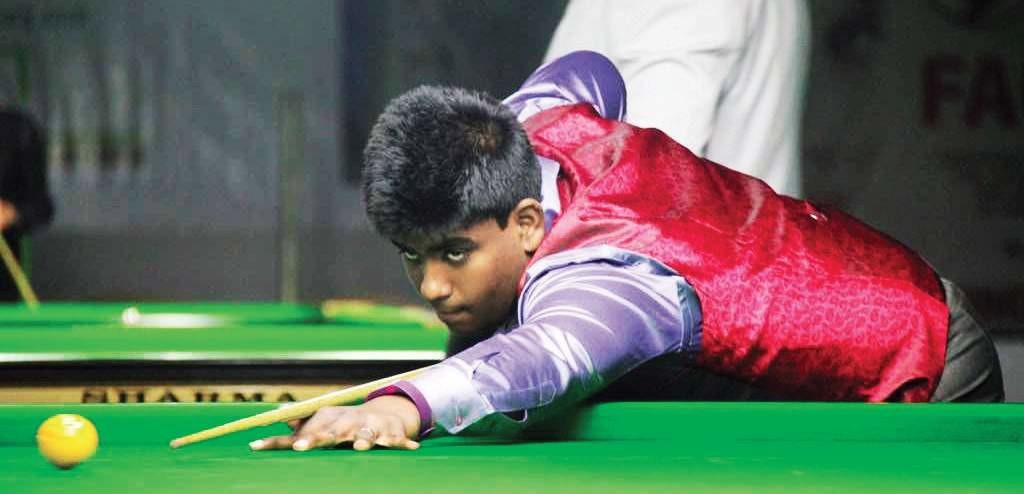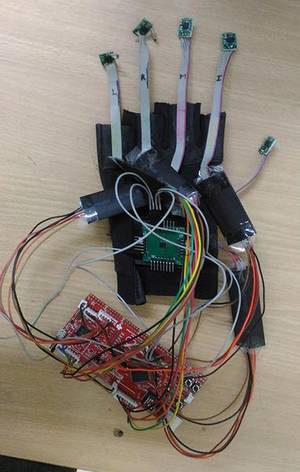Monthly Archives: April 2017
35
34
33
32
31
30
To take a cue and succeed

Chennai :
I don’t have fear in my game,” proclaims S Shrikrishna. While this may seem a tad arrogant at first, he explains that it’s just a mantra he follows. “Both my father and coach once told me a line: ‘Don’t fear your opponent, make him fear you’. And that’s exactly what I try to do in every match; it has helped me succeed,” adds the Chennai lad.
For those wondering, Shrikrishna is the National Junior Billiards champion. His next outing will be the ongoing 12th R Murugesh & Chintamani Memorial all-India Open Snooker Tournament in Erode.
True to his word, the 17-year-old is not worried about things like his national champion status or the fact that he will be a home favourite in the upcoming tournament. “I don’t let such things bother me. This is the second time I’ll be participating in the Erode event and I know what I’m capable of. My focus is to improve match after match and not worry about what the opponent thinks of me or what strategy they will employ,” says Shrikrishna.
His initiation into cue sports was when as a 10-year-old he witnessed his parents take to the green table at the Mylapore Club. But what happened after is more interesting. “When I saw my parents play, I knew I wanted to give it a try as well. But at that time the rules said that children below 12 aren’t allowed to play. My father then took the issue to the manager, who allowed me to play a few shots. That is when he realised I was good at it. They changed the rules immediately after,” says Shrikrishna who is a Class 11 student at National Public School, Gopalapuram.
He performed consistently well, even entering competitions soon enough. “I joined my coach, Nadeem Ahmed at the Tamil Nadu Billiards & Snooker Association (TNBSA) premises soon after the Mylapore Club episode. Unlike others, I started competing a couple months after picking up the stick for the first time. It was only due to the support of my coach and father that this was possible,” he adds.
Shrikrishna is entering a crucial phase in life; he is going to appear for the Class 12 exams next year. But Shrikrishna has it all figured out. “I can’t take a chance with my boards. The nationals will be next January, and that will be the last event I will participate in before the exam.”
source: http://www.newindianexpress.com / The New Indian Express / Home> Cities> Chennai / by Ravi Iyer / Express News Service / April 27th, 2017
Tamil Nadu girl bags silver in Asian youth chess championship
Cuddalore :
A 13-year-old girl from Neyveli, Cuddalore district, clinched silver medal in the Asian youth chess championship held at Tashkent, Uzbekistan. L Jyothsna overcame stiff competition from players from 13 countries, to finish second in the under 14 girls’ category in the Asian event.
This is her maiden medal in an Asian event in which she lost a round, drew two and won six. She also clinched bronze medal in the Blitz chess championship and finished fifth in the Rapid chess championship of the same meet. Another girl from India, D Jishitha from Andhra Pradesh, who lost a round, drew one and won seven, clinched the gold medal.
Nurgali Nazerke from Kazakhstan, who lost two rounds, drew three and won four rounds, had to be content with the bronze medal. Indian players fared better in championships, topping the medals tally with 12, followed by the host nation (Uzbekistan) with 10 medals.
A Class 7 student of St Joseph of Cluny matriculation higher secondary school, Neyveli, Jyothsna was selected to represent the country in her category for the second time in an Asian event after her stellar performance in the national level chess championship organised by the All India Chess Federation at Ahmedabad in 2016, where she bagged the bronze. She could not make a mark at her maiden appearance at the 2016 Asian championship at Mongolia in which another Indian Divya Deshmukh bagged the title in her category.
After a disappointing performance in the 2016 Asian championship where she finished fourth she was determined to fare well in this year Asian event. A positional player she played exceptionally well overcoming the attacking game of others and secured silver medal. We are happy about her performance and hope she will improve by leaps and bounds in the seasons to come,” said her father K Lakshminarayanan, an executive engineer at the NLC India Limited, while appreciating the company for sponsoring her expenses.
Jyothsna, whose highest ranking was number two in her category in the country, has been consistently performing well at the national events, winning bronze medal in 2015 (under-11) at Puducherry and finishing fifth in 2013 (under-9) at Chennai, besides bagging last year’s national bronze medal. She had also bagged gold medal (under-11) in the 2015 state level chess championship at Nagappatinam and silver medal (under-13) in the 2013 state level chess championships at Nagercoil.
Her only ambition is to become a woman grandmaster. “There are seven women grandmasters in the country. I would like to play more open tournaments so that I can face many grandmasters and consistently defeat them to achieve my dream. I have been training more than six hours a day for the last two years,” Jyothsna said.
Her coach and NLC India Limited deputy chief manager (sports development centre) Fide master A Pavanasam said Jyothsna is a passive but very solid player. “She does not want to lose and hence tends to play for a draw. We are trying to mould her into an attacking player, which will bear more fruits,” Pavanasam said.
source: http://www.timesofindia.indiatimes.com / The Times of India / News> City News> Chennai News / by Bosco Dominique / TNN / April 27th, 2017
A data glove for the speech-disabled

15 sensors that help gather data on kinematics or hand motion
A data glove, which measures the individual joint angles of all the five fingers to understand the activity of daily living, developed by Nayan Bhatt, Research Scholar from the Department of Applied Mechanics, IIT Madras, recently won the Budding Innovators Award given by the Delhi-based National Research Development Corporation (NRDC). Mr. Bhatt has been working on developing models for studying finger kinematics for the past three years.
The data glove has 15 sensors (plus an additional reference sensor) that help in gathering information about kinematics or hand motion. The sensors are placed on the segments of a finger — each finger has three segments and the junction between two segments forms a joint. Each sensor is connected to a microcontroller board using a flexible wire to collect data.
“The sensors measure the joint angles through the change in orientation information. We are interested in gathering information about motion of the fingers excluding the wrist,” said Mr. Bhatt. “In the case of people with Parkinson’s disease, the data glove will provide information about hand kinematics and help clinicians assess the severity of disease. It will complement the traditionally used Universal Parkinson’s Disease Rating Scale.”
Avoiding deformation
The development may find application in animation and other industries.
Unlike in the case of the conventional data glove, the sensors are placed directly on each segment of the finger to avoid any deformation. “We placed the sensors directly on the segments of fingers as the use of cloth like in a traditional data glove can hinder natural movements and also cause slippage or deformation,” he said.
Efforts are on to reduce the number of sensors used. “We will first use all the 15 sensors to perform some training postures, which will then be used for developing an algorithm that will reduce the number of sensors used. Currently, with the machine learning algorithm developed by Mr. Bhatt we can use as few as eight sensors. We want to reduce it to six,” said Dr. Varadhan S.K.M. from the Biomedical Engineering Division of the Department of Applied Mechanics, IIT Madras.
“We are using the prototype to develop products for speech-related disability,” Dr. Varadhan said. “By using specific movements of a finger for specific words, the data glove can help speech-disabled people to communicate. We can use a speech synthesiser and speaker to generate sound.” Work has to be done to first map specific words to specific movements of the finger.
21 angles
One finger can move in different directions. So the total number of joint angles is about 21. Sensors have been used to sense all the 21 angles. “Ten predicted angles have large errors of more than two degree, and the remaining angles have less than 2 degree error. The average is five degrees. In a few months, with advanced algorithms, we might be able to reduce the average prediction error to two-three degrees,” Dr. Varadhan said.
source: http://www.thehindu.com / The Hindu / Home> Sci-Tech> Technology / by R. Prasad / Chennai – April 26th, 2017